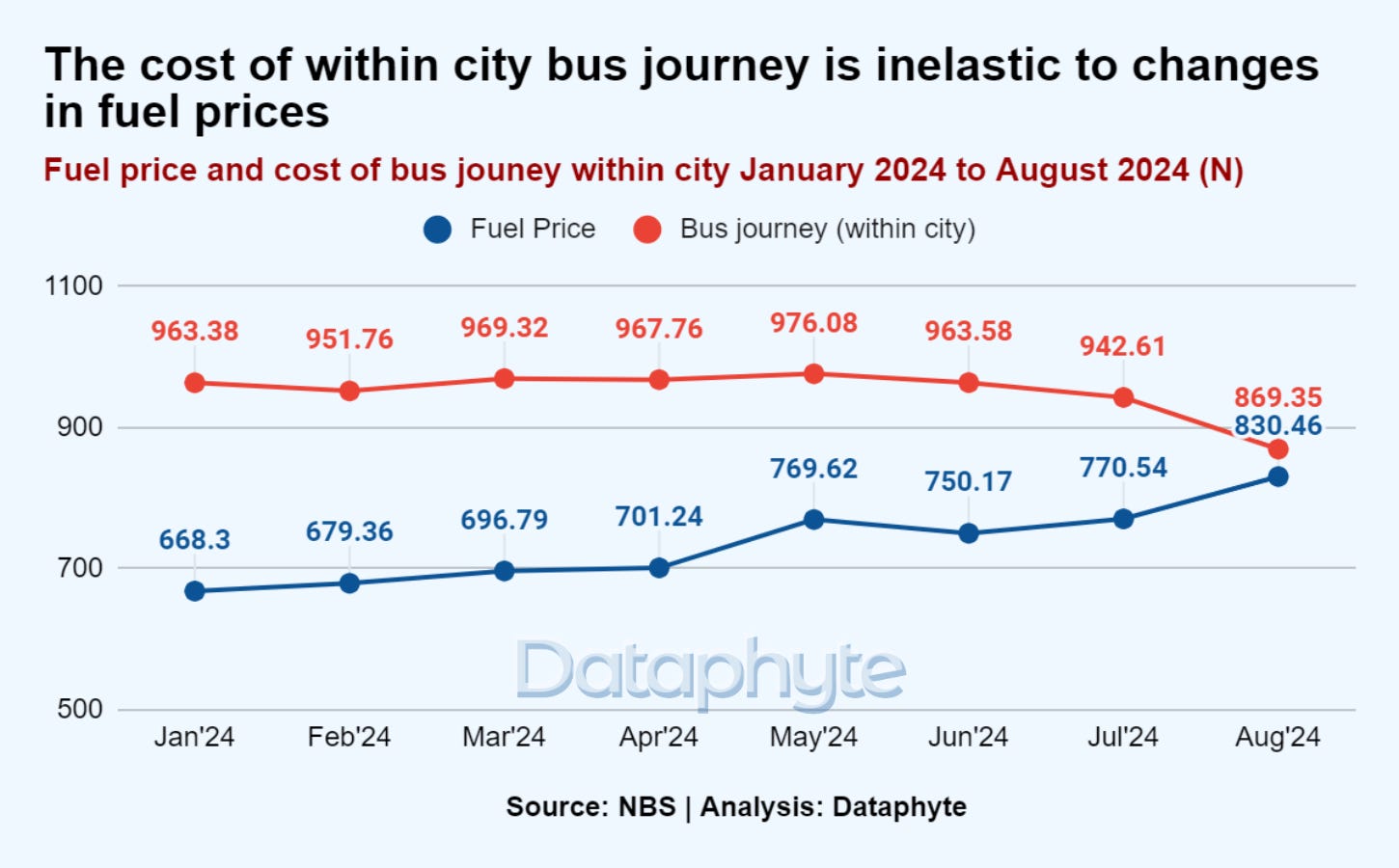ICYMI: Carpooling and other Survival Tactics: How Nigerians Are Tackling Rising Transport Costs
The recent removal of fuel subsidies in May 2023 has led to an average fuel price increase of about 250%.
Despite this increase, the cost of transportation for bus journeys within cities has seen both a month-on-month and year-on-year decrease. This implies that in August 2024, transportation prices for bus journeys within cities were significantly cheaper than they were in August 2023 and July 2024.
The year-on-year growth rate, in this case, compares one challenging period to another. Right after the removal of subsidies, there was a surge in transportation costs as well as commodity prices.
The year-on-year change is usually used to measure long-term trends, while month-on-month changes reflect short-term impacts of economic indicators or shifts in parameters.
Nigerians typically engage in more intracity journeys than intercity journeys, live and work within the same city, requiring daily commutes for work, school, and other routine activities. Intercity journeys are more occasional, often reserved for holidays, business trips, or visits to rural areas and smaller towns.
This decrease might be a result of Nigerians being forced to adopt new coping strategies to manage the rising cost of transportation, with more citizens turning to alternatives such as carpooling, use of staff buses or prioritizing essential trips.
Data from the National Bureau of Statistics (NBS) shows that public transport fares for intra-city journeys declined by 7.77% in August 2024 alone. This decrease has been recorded for three consecutive months for bus journeys within cities.
The year-on-year and month-on-month negative change in the cost of bus journeys, despite rising fuel prices, may suggest that there is parallel market competition influencing prices due to lower demand.
This implies that Nigerians are prioritizing their most essential movements first, and carpooling has increased. Consequently, the low demand for this mode of transportation has forced operators to reduce prices.
The shift towards carpooling and employer-sponsored transportation schemes is directly linked to the pressure created by rising fuel prices. As a result, more people are pooling resources to share costs, particularly in major cities like Lagos and Abuja, where daily transport expenses have doubled.
This aligns with the economic burden felt by the average Nigerian, as the search for alternative transportation methods has become a necessity rather than a choice.
Who bears the burden of increased fuel cost?
The cost of public transport may still be somewhat influenced by these factors, even though overall fuel prices have increased significantly, especially with the cessation of subsidies in May 2023.
As a result, commuters would not be fully impacted by increased fuel prices in bus rates, protecting the end users. For instance, bus fares only slightly increased to N976.08 in May 2024 from N967.76 in April 2024, despite an increase in fuel costs to N769.62 from N701.24 during the same period.
This suggests that bus operators may not have fully passed on the burden of cost of fuel to customers.
The fact that bus fares have not increased in response to rising fuel prices indicates that different players bear different portions of the cost of higher fuel. Most of these costs are probably absorbed by bus operators through operational cost reduction, fuel efficiency, or profit margin reduction to stay competitive.
Government actions, such as price limits or subsidies, in the case of the Lagos BRT may occasionally serve as an indirect counterbalance to fuel price increases, preventing operators from transferring the entire cost to commuters.
While commuters do not experience immediate fare spikes, they may face indirect costs such as diminished service quality, longer wait times, or the need to seek alternate means of transportation. Additionally, as operators modify to manage the costs, other stakeholders, such as bus conductors, may also be impacted by cost-cutting efforts.









